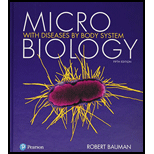
Microbiology with Diseases by Body System (5th Edition)
5th Edition
ISBN: 9780134477206
Author: Robert W. Bauman Ph.D.
Publisher: PEARSON
expand_more
expand_more
format_list_bulleted
Concept explainers
Textbook Question
Chapter 4, Problem 4FIB
Fill in the Blanks
4. ___________ refers to differences in intensity between two objects.
Expert Solution & Answer
Want to see the full answer?
Check out a sample textbook solution
Students have asked these similar questions
What is the difference between Uniporters, Symporters and Antiporters? Which of these are examples of active transport?
What are coupled transporters?
What are “domains” and how do they aid in protein function?
Chapter 4 Solutions
Microbiology with Diseases by Body System (5th Edition)
Ch. 4 - Prob. 1TMWCh. 4 - Why is a Gram-negative bacterium colorless but a...Ch. 4 - Why didnt Linnaeus create taxonomic groups for...Ch. 4 - Necrotizing Fasciitis Fever, chills, nausea,...Ch. 4 - Why is magnification high and color absent in an...Ch. 4 - Prob. 1MCCh. 4 - Prob. 2MCCh. 4 - Prob. 3MCCh. 4 - Curved glass lenses _________ light. a. refract b....Ch. 4 - Prob. 5MC
Ch. 4 - Prob. 6MCCh. 4 - Prob. 7MCCh. 4 - Prob. 8MCCh. 4 - Prob. 9MCCh. 4 - In the binomial system at nomenclature, which term...Ch. 4 - Prob. 1FIBCh. 4 - Prob. 2FIBCh. 4 - Prob. 3FIBCh. 4 - Fill in the Blanks 4. ___________ refers to...Ch. 4 - Fill in the Blanks 5. Cationic chromophores such...Ch. 4 - Prob. 1VICh. 4 - Label the microscope.Ch. 4 - Prob. 1SACh. 4 - Critique the following definition of magnification...Ch. 4 - Prob. 3SACh. 4 - Put the following substances in the order they are...Ch. 4 - Prob. 5SACh. 4 - Prob. 6SACh. 4 - Prob. 7SACh. 4 - Prob. 8SACh. 4 - Miki came home from microbiology lab with green...Ch. 4 - Why is the definition of species as successfully...Ch. 4 - With the exception of the discovery of new...Ch. 4 - Prob. 4CTCh. 4 - Prob. 5CTCh. 4 - In what ways are the Gram stain and the acid-fast...Ch. 4 - Microbiologists have announced the discovery of...Ch. 4 - Why is the genus name Coccus placed within...Ch. 4 - A clinician obtains a specimen of urine from a...Ch. 4 - Using the following terms, fill in the following...
Knowledge Booster
Learn more about
Need a deep-dive on the concept behind this application? Look no further. Learn more about this topic, biology and related others by exploring similar questions and additional content below.Similar questions
- What are intrinsically disordered proteins, and how might they be useful for a living system?arrow_forwardWhat are Amyloid Fibrils? What biological functions are these known to perform?arrow_forwardHow do histamine and prostaglandins help in the mobilization of leukocytes to an injury site? What are chemotactic factors? How do they affect inflammation process?arrow_forward
- Compare and contrast neutrophils and macrophages. Describe two ways they are different and two ways they are similar.arrow_forwardDescribe the effects of three cytokines (not involved in the initial inflammation response). What cells release them?arrow_forwardDescribe activation of helper T cells or cytotoxic T cellsarrow_forward
- Compare and contrast MHC 1 and MHC 2. Describe two way they are different and two ways they similar including how they are used in antigen presentation.arrow_forwardDescribe two antimicrobial properties of the skin.arrow_forwardDescribe how the inflammation response starts including the sentinel cells and the chemicals involved. How do pathogens trigger the response particularly in the skin?arrow_forward
- How does complement promote the immune response? Describe three waysarrow_forwardWhich of the following is not a possible mechanism for autoimmunity? Select one: A. Abnormal expression of MHC II molecules in non-antigen-presenting cells B. Activation of polyclonal B cells C. Polymorphism of HLA alleles D. Molecular mimicry E. Release of sequestered antigensarrow_forwardWRITTEN WORK 3: NON-MENDELIAN GENETICS Part A: Complete the Punnett square and calculate for the probability of genotype and phenotype. i i Genotype: Phenotype: 08:55arrow_forward
arrow_back_ios
SEE MORE QUESTIONS
arrow_forward_ios
Recommended textbooks for you


Bacterial Structure and Functions; Author: Osmosis;https://www.youtube.com/watch?v=b15Hy3jCPDs;License: Standard youtube license